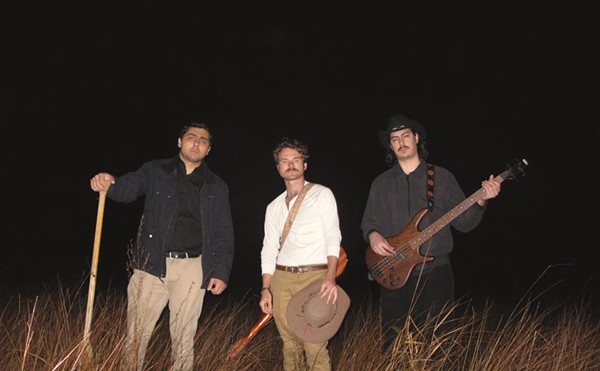The primary thing that made Fleetwood Mac such a great band was their down-to-earth, could-be-living-next-door life-style. The average, ordinary existence the principals in the group lived not only resonated with the hoi polloi, but also gave the music of the Mac its rustic, blue-collar appeal. OK, maybe not. But if nonstop relationship turmoil, excessive amounts of cash and septum-exploding piles of cocaine are what it takes to make music as wonderful as the songs locked away on the California Pop Trilogy ("Fleetwood Mac," "Rumours" and "Tusk"), then goddammit, I applaud the band for their noble suffering. (I hope I'm not the only one who thinks Stevie Nicks is a bit disingenuous for acting like having coke snorted out of the crack of her ass on a private Learjet between shows is some sort of blues-song fodder.)
Now, I'm not saying that if I was "suffering" that "badly," I'd be able to crank out tunes as glorious as the Trilogy. For it must be said, up front, that the Trilogy is perhaps the most dauntingly impressive batch of music committed to tape during the 1970s, if not during the last half of the 20th century. Yes, there are many other albums that were individually better than each of these individual albums. But, taken collectively and viewed from a pure-pop perspective (thus excluding pre-"Diver Down" Van Halen), these 43 songs are rivaled only by The Beatles' run between Rubber Soul and "Sgt. Pepper's" (and, polemicist that I am, I'll contend that "Rumours" can run drug-addled circles around that last inconsistent conceptual mess any day). And, if I may further beg your humor, were possibly the last consecutive batch of really great pop albums from one band that we'll ever see.
As easy as it is to ascribe the creative and commercial success of the Trilogy to synchronicity, that doesn't tell nearly the whole story. Certainly, the sound of the Trilogy crystallized the time and place from which it came, and the Mac enjoyed the confluence of a supremely effective pop-music marketing machine and the somewhat more sophisticated tastes of a post-Beatles landscape. But the oft-told story of a static blues-rock band mutated by the melancholy sunshine of Buckingham/ Nicks is more resonant, for it's the combination of disparate musical elements (not to mention personality types) that makes the Trilogy so extraordinary. The "blues" are upbeat, the "rock" is light and the "pop" is melting with sadness; in other words, nothing sounds as it should and the result is the kind of creative alchemy that produces something truly great.
But you should know that. The Trilogy has collectively shifted some 50 million copies worldwide, which means if you haven't heard it, you're likely deaf. Sadly, for the three decades of the Trilogy's existence, it's sounded like shit. Initially released during a trend of thin, weak-sounding vinyl LPs and then sloppily transferred to CD at the beginning of the CD era, these three albums have never sounded as good as they could to the millions of people who love them. (Only "Rumours" has been treated to audiophile editions.) With the all-at-once reissue of all three albums by Rhino -- wonderfully remastered with a total of 42 demos, outtakes and other bonus material spread out among them -- the Trilogy should redeem its position as a pop-music primer and not just as a '70s culture artifact. These are, without a doubt, great and important albums that are finally getting the sonic treatment they deserve. Buy an eightball and enjoy.
















